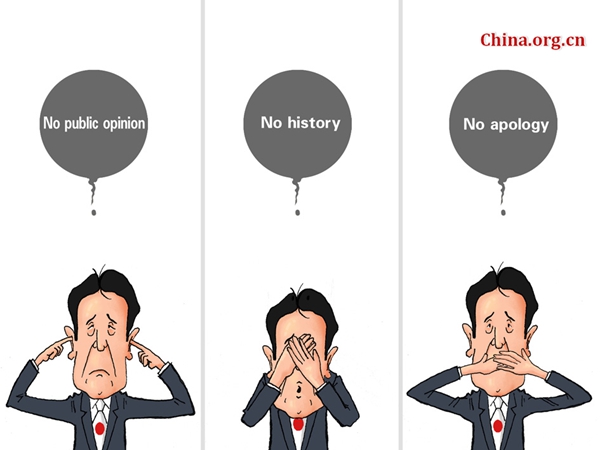The importance of a word and Japan's apology
- By Sumantra Maitra
 0 Comment(s)
0 Comment(s) Print
Print E-mail China.org.cn, August 14, 2015
E-mail China.org.cn, August 14, 2015
|
|
|
[By Zhai Haijun/China.org.cn] |
There has been speculation about whether Japanese Prime Minister Shinzo Abe is going to give his heartfelt apology with regards to Japan's brutal wartime occupation of Korea and China. At the time of writing this, this columnist's guess is no, but we shall see.
There is also discussion about whether Japan is going back to its militaristic path, whether there is a sense in Japanese society of breaking free from wartime guilt, and whether Japan is following a classic case of historical revisionism. But how important is a formal apology, how many times does Japan need to apologize, and why is Asia different to Europe in transcending the scars of World War II, are some of the questions that need to be pondered, at this important juncture of our history.
Abe is the grandson of Nobusuke Kishi, an influential nationalist figure in Japanese politics, who increased military to military cooperation with the United States, in the face of massive domestic opposition. Abe comes from that bloodline and political upbringing. He wrote once in his book that military alliances are like blood alliances, and if Japan is not willing to shed blood, then Japanese people shouldn't expect United States to come and defend it.
Shinzo Abe is a revisionist head of state, and the reasons for his revisionism are multipronged. First of all, time is the most important factor. Seventy years after the war ended, the cultural amnesia of Japan and the world has glossed over the fact that Japan was an aggressor in World War II, and not a victim. The use of the first ever nuclear bomb on Japan to end the war, and the subsequent rhetoric has painted this helpless victim picture of the Japanese imperial state. Especially if one goes and communicates with the younger Japanese populace, whose formative years were after the end of the Cold War, one will find a complete lack of historical knowledge and relevance of the war in Japanese society.
Secondly, Shinzo Abe is not going to follow the then Tomichi Murayama's apology from 1995, which was possibly the first time the word "apology" was used in the speech of any Japanese head of state, rather than regret or remorse. Here's why. The situation in Asia is very different from even 20 years back. China is regarded widely as the next superpower, and the challenger to U.S. global hegemony. There is the potential for clashes in both the South and East China Sea, and to a little lesser extent in the Indian Ocean.
Added to that is the relative decline in the U.S. economy and the perception of the U.S. security umbrella over Japan, and in that context the United States is actively encouraging Japan to shoulder some of its security burden. Recently, the Japanese PM pushed through some contentious reforms, where Japan will be now able to send troops abroad in conflict, even without its post war "active defense" policy, thereby slowly changing the Japanese national identity. It is perhaps historically ironic that the two countries that directly faced Japanese aggression during World War II, the United States and China, might perhaps be dragged in a conflict with regards to Japan. In this context, it will be politically contradictory for Abe to promote a change in military doctrine and also apologize for its militaristic past.







Go to Forum >>0 Comment(s)